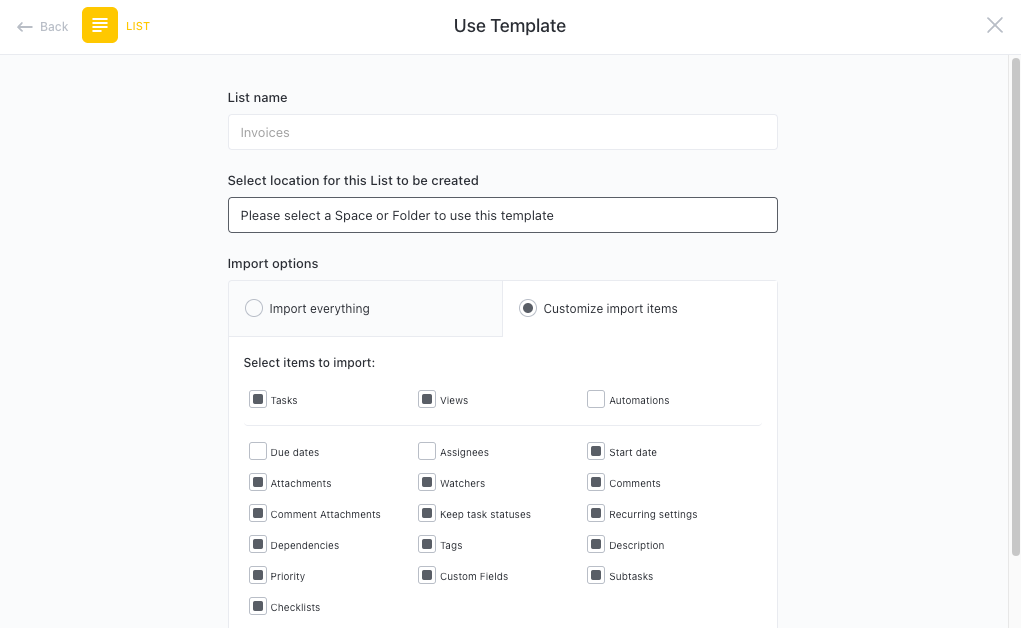Keeping your bookkeeping processes on track and your team aligned is essential for financial success. With ClickUp's Bookkeepers Meeting Agenda Template, you can streamline your meetings and ensure that all important topics are covered.
This template helps bookkeeping teams or professionals:
- Structure and plan meetings effectively
- Discuss key areas such as financial reporting, budgeting, and tax compliance
- Track progress on action items and assign tasks for seamless bookkeeping operations
No more wasting time figuring out what to discuss or missing important topics. ClickUp's Bookkeepers Meeting Agenda Template has got you covered, so you can focus on keeping your books in order. Try it out today!
Benefits of Bookkeepers Meeting Agenda Template
Running a smooth and efficient bookkeeping operation requires effective meetings. The Bookkeepers Meeting Agenda Template helps you:
- Structure and plan your meetings, ensuring all important topics are covered
- Track progress on financial reporting, budgeting, accounts reconciliation, and tax compliance
- Assign action items to team members for follow-up and accountability
- Foster open communication and collaboration among team members
- Streamline decision-making processes for more efficient bookkeeping operations
Main Elements of Bookkeepers Meeting Agenda Template
Stay organized and structured during your bookkeepers' meetings with ClickUp's Bookkeepers Meeting Agenda template.
This template includes:
- Meeting Agenda Structure: Use the Doc template to create a detailed agenda for your bookkeepers' meetings, including sections for discussing financial reports, budget updates, client inquiries, and more.
- Custom Statuses: Assign statuses such as “To Do,“ “In Progress,“ and “Completed“ to each agenda item, allowing you to track the progress of each discussion point.
- Custom Fields: Add custom fields such as “Meeting Date,“ “Assigned To,“ and “Priority“ to capture important information for each agenda item and ensure nothing falls through the cracks.
- Different Views: Utilize different views, such as the Board view for a visual representation of the agenda items, the Table view for a spreadsheet-like overview, and the Calendar view to schedule and track meeting dates.
How to Use Meeting Agenda for Bookkeepers
When it comes to running an efficient and productive bookkeepers meeting, having a clear agenda is key. Follow these six steps to make the most out of your Bookkeepers Meeting Agenda Template in ClickUp:
1. Identify meeting objectives
Before creating your agenda, determine the main objectives for your bookkeepers meeting. Are you discussing financial reports, addressing any issues or concerns, or providing updates on ongoing projects? Clearly defining the purpose of the meeting will help you create a focused agenda that covers all necessary topics.
Use a Doc in ClickUp to outline the objectives and agenda items for your meeting.
2. List agenda items
Once you know the meeting objectives, create a list of agenda items that need to be discussed. This could include reviewing financial statements, discussing any discrepancies, addressing client concerns, or planning for upcoming tasks.
Create tasks in ClickUp to represent each agenda item and assign them to relevant team members.
3. Set time allotments
Assign specific time allotments for each agenda item to ensure that the meeting stays on track and doesn't run over time. This will help you prioritize important discussions and allocate enough time for each topic.
Use the Gantt chart in ClickUp to visually allocate time for each agenda item.
4. Prepare supporting documents
Gather all relevant documents, reports, and data that will be needed during the meeting. This could include financial statements, client records, project updates, or any other materials that will help facilitate discussions and decision-making.
Use the Docs feature in ClickUp to upload and share supporting documents with meeting participants.
5. Distribute the agenda
Send out the agenda to all meeting participants in advance, allowing them time to review and prepare. This will ensure that everyone is on the same page and can come prepared with any necessary information or questions.
Use the Email integration in ClickUp to easily distribute the agenda to all meeting participants.
6. Conduct the meeting
During the meeting, follow the agenda and make sure to address each item within the allocated time. Encourage active participation and open discussion to gather insights and input from all team members. Take notes, document any decisions or action items, and assign responsibilities for follow-up tasks.
Use the Docs feature in ClickUp to take meeting minutes and record any important information or decisions made during the meeting.
By following these six steps, you can run effective bookkeepers meetings that are focused, productive, and help keep your financial processes running smoothly.

Get Started with ClickUp’s Bookkeepers Meeting Agenda Template
Bookkeeping teams or professionals can use this Bookkeepers Meeting Agenda Template to structure and plan their meetings, ensuring that important topics such as financial reporting, budgeting, accounts reconciliation, and tax compliance are discussed, progress is tracked, and action items are assigned for effective bookkeeping operations and decision-making.
First, hit “Add Template” to sign up for ClickUp and add the template to your Workspace. Make sure you designate which Space or location in your Workspace you’d like this template applied.
Next, invite relevant members or guests to your Workspace to start collaborating.
Now you can take advantage of the full potential of this template to conduct productive bookkeeping meetings:
- Use the Financial Reporting View to discuss and review financial statements and performance
- The Budgeting View will help you plan and allocate resources effectively
- Utilize the Accounts Reconciliation View to ensure accuracy and identify discrepancies
- The Tax Compliance View will assist in discussing compliance with tax regulations and deadlines
- Organize meeting topics into different statuses to track progress and action items
- Update statuses as you discuss and finalize topics during the meeting
- Assign action items and due dates to team members for follow-up
- Monitor and analyze meeting outcomes to improve bookkeeping processes and decision-making.








